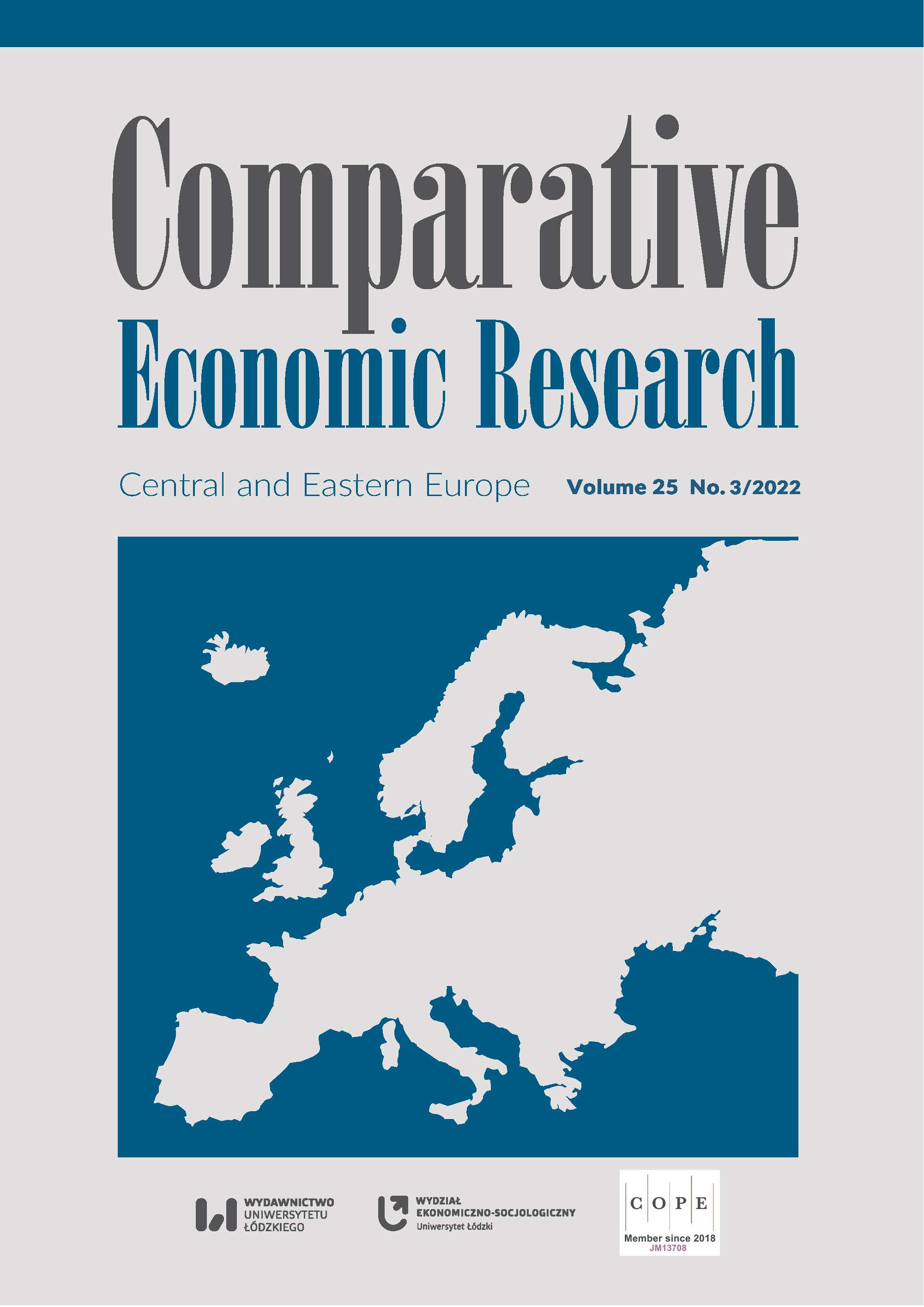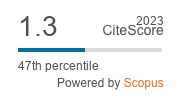Determinants of International Reserves Among Organisation of Petroleum Exporting Countries (OPEC)
DOI:
https://doi.org/10.18778/1508-2008.25.24Keywords:
international reserves, Organisation of Petroleum Exporting Countries, crude oil prices, exchange rates, international tradeAbstract
Member countries of the Organisation of Petroleum Exporting Countries (OPEC) are always in the news regarding the prices and supply of crude oil to the international market. One of the economic reasons for this is liquidity and the desire to accumulate international reserves by the respective countries. This paper examined the determinants of international reserves among the cartel against the backdrop of the motives for keeping reserves. With data from 2005 to 2018, the adopted variables that were tested with the system of generalised methods of moments (Sy‑GMM) are inflation, exchange rates, oil prices, crude oil dependence, economic crises and others. The results and outputs show that inflation was negatively impactful externally and internally, while FDI inflows recorded negative significance. Economic crises and economic openness were positively significant, while oil prices and exchange rates were not significant determinants of international reserves accumulation. The paper recommends the maximisation of opportunities available by members during economic crises to accumulate reserves that will enable them to diversify from dependence on crude oil exports to include other products and a higher level of openness to open the economy up for competition to make the economies stronger.
Downloads
References
Adetiloye, K.A. (2015), Business Investment and the Nigerian Investible Capital Hemorrhage in Financial Crises, [in:] C. Das (ed.), Handbook of Research on Globalization, Investment, and Growth‑Implications of Confidence and Governance, IGI Global, Hershey, pp. 416–436, https://doi.org/10.4018/978-1-4666-8274-0.ch020
Google Scholar
DOI: https://doi.org/10.4018/978-1-4666-8274-0.ch020
Aizenman, J. (2008), International Reserve Management and the Current Account, [in:] K. Cowan, S. Edwards, R.O. Valdés (eds.), Current Account and External Financing, Central Bank of Chile, Santiago, pp. 435–474.
Google Scholar
Aizenman, J., Ito, H. (2012), Trilemma policy convergence patterns and output volatility, “The North American Journal of Economics and Finance”, 23 (3), pp. 269–285, https://doi.org/10.1016/j.najef.2012.03.002
Google Scholar
DOI: https://doi.org/10.1016/j.najef.2012.03.002
Aizenman, J., Riera‑Crichton, D. (2008), Real Exchange Rate and International Reserves in an Era of Growing Financial and Trade Integration, “The Review of Economics and Statistics”, 90 (4), pp. 812–815, https://doi.org/10.1162/rest.90.4.812
Google Scholar
DOI: https://doi.org/10.1162/rest.90.4.812
Aizenman, J., Cheung, Y., Qian, X.W. (2019), The currency composition of international reserves, demand for international reserves, and global safe assets, “Journal of International Money and Finance”, 102, 102120, https://doi.org/10.1016/j.jimonfin.2019.102120
Google Scholar
DOI: https://doi.org/10.1016/j.jimonfin.2019.102120
Al Rousana, S., Sbia, R., Tas, B.K.O (2018), A dynamic network analysis of the world oil market: Analysis of OPEC and non‑OPEC members, “Energy Economics”, 75, pp. 28–41, https://doi.org/10.1016/j.eneco.2018.07.032
Google Scholar
DOI: https://doi.org/10.1016/j.eneco.2018.07.032
Al‑Fattah, S.M. (2020), Non‑OPEC conventional oil: Production decline, supply outlook and key implications, “Journal of Petroleum Science and Engineering”, 189, 107049, https://doi.org/10.1016/j.petrol.2020.107049
Google Scholar
DOI: https://doi.org/10.1016/j.petrol.2020.107049
Alberola, E., Erce, A., Serena, J.M. (2015), International reserves and gross capital flows dynamics, “Journal of International Money and Finance”, 60, pp. 151–171, https://doi.org/10.1016/j.jimonfin.2015.09.003
Google Scholar
DOI: https://doi.org/10.1016/j.jimonfin.2015.09.003
Alfalih, A.A., Bel Hadj, T. (2020), Foreign direct investment determinants in an oil abundant host country: Short and long run approach for Saudi Arabia, “Resources Policy”, 66, 101616, https://doi.org/10.1016/j.resourpol.2020.101616
Google Scholar
DOI: https://doi.org/10.1016/j.resourpol.2020.101616
Arellano, M., Bond, S. (1991), Some Tests of Specification for Panel Data: Monte Carlo Evidence and an Application to Employment Equations, “The Review of Economic Studies”, 58 (2), pp. 277–297, https://doi.org/10.2307/2297968
Google Scholar
DOI: https://doi.org/10.2307/2297968
Bankole, A.S., Shuaibu, M.I. (2013), International Reserve and Oil Price Movement: Evidence from Nigeria, “Ibadan Journal of the Social Sciences”, 11 (2), pp. 70–85.
Google Scholar
Bond, S.S., Hoeffler, A., Temple, J. (2001), GMM Estimation of Empirical Growth Models, “Economics Papers”, W21 (1), Economics Group, Nuffield College: University of Oxford.
Google Scholar
Choi, W.G., Sharma, S., Strömqvist, M. (2007), Capital Flows, Financial Integration, and International Reserve Holdings: The Recent Experience of Emerging Markets and Advanced Economies, “IMF Working Paper”, WP/07/151, https://doi.org/10.5089/9781451867152.001
Google Scholar
DOI: https://doi.org/10.5089/9781451867152.001
Čech, Z., Jevčák, A. (2011), International reserves in the CEE8 – lessons from the financial crisis, “ECFIN Country Focus”, 8 (2), pp. 1–8.
Google Scholar
Dominguez, K.M.E., Hashimoto, Y., Ito, T. (2012), International reserves and the global financial crisis, “Journal of International Economics”, 88 (2), pp. 388–406, https://doi.org/10.1016/j.jinteco.2012.03.003
Google Scholar
DOI: https://doi.org/10.1016/j.jinteco.2012.03.003
Dooley, M.P., Folkerts‑Landau, D., Garber, P. (2004), An Essay on the Revived Bretton Woods System, “NBER Working Paper National”, No. 9971, National Bureau of Economic Research, Cambridge, https://doi.org/10.3386/w9971
Google Scholar
DOI: https://doi.org/10.3386/w9971
Energy Information Administration (2021), Annual energy Outlook 2021 with projections to 2050, https://www.eia.gov/outlooks/aeo/pdf/AEO_Narrative_2021.pdf (accessed: 2.06.2022).
Google Scholar
European Central Bank (2006), The Accumulation of Foreign Reserves, “Occasional Paper Series”, No. 43, https://www.ecb.europa.eu/pub/pdf/scpops/ecbocp43.pdf (accessed: 17.03.2021).
Google Scholar
European Central Bank (2012), The external environment of the euro area, “Economic and Monetary Developments. ECB Monthly Bulletin”, June, https://www.ecb.europa.eu/pub/pdf/mobu/mb201310en.pdf (accessed: 21.03.2022).
Google Scholar
Fischer, S. (2001), IMF/World Bank International Reserves: Policy Issues Forum – Opening Remarks by IMF First Deputy Managing Director Stanley Fischer, International Monetary Fund, http://www.imf.org/external/np/speeches/2001/042801.htm (accessed: 3.06.2022).
Google Scholar
Frenkel, J.A., Jovanovic, B. (1981), Optimal International Reserves: A Stochastic Framework, “The Economic Journal”, 91 (362), pp. 507–514, https://doi.org/10.2307/2232599
Google Scholar
DOI: https://doi.org/10.2307/2232599
Gil‑Alanaab, L.A., Dadgar, Y., Nazari, R. (2020), An analysis of the OPEC and non‑OPEC position in the World Oil Market: A fractionally integrated approach, “Physica A: Statistical Mechanics and its Applications”, 541 123705, https://doi.org/10.1016/j.physa.2019.123705
Google Scholar
DOI: https://doi.org/10.1016/j.physa.2019.123705
Gosh, A.R., Ostry, J.D., Tsangarides, C.T. (2014), Accounting for emerging market countries’ international reserves: Are Pacific Rim countries different?, “Journal of International Money and Finance”, 49 (A), pp. 52–82, https://doi.org/10.1016/j.jimonfin.2014.05.006
Google Scholar
DOI: https://doi.org/10.1016/j.jimonfin.2014.05.006
Ibhagui, O.W. (2020), The Economic Performance Effects of Capital Flows in OPEC Member Countries, “The Quarterly Review of Economics and Finance”, 75, pp. 67–83, https://doi.org/10.1016/j.qref.2019.05.015
Google Scholar
DOI: https://doi.org/10.1016/j.qref.2019.05.015
International Monetary Fund (2009), International Monetary Fund. Annual Report, http://www.imf.org/external/pubs/ft/ar/2009/eng/pdf/a1.pdf (accessed: 2.06.2022).
Google Scholar
DOI: https://doi.org/10.5089/9781451802993.002
International Relations Committee Task Force (2006), The Accumulation of Foreign Reserves, “European Central Bank Occasional Paper”, No. 43, February.
Google Scholar
Irefin, D., Yaaba, B.N. (2011), Determinants of foreign reserves in Nigeria: An autoregressive distributed lag approach, “CBN Journal of Applied Statistics”, 02 (2), The Central Bank of Nigeria, Abuja, pp. 63–82.
Google Scholar
Jeanne, O., Rancière, R. (2006), The Optimal Level of International Reserves for Emerging Market Countries: Formulas and Applications, “IMF Working Paper”, WP/06/229, https://doi.org/10.5089/9781451864892.001
Google Scholar
DOI: https://doi.org/10.5089/9781451864892.001
Lane, P.R., Milesi‑Ferretti, G.M. (2007), The external wealth of nations mark II: Revised and extended estimates of foreign assets and liabilities, 1970–2004, “Journal of International Economics”, 73 (2), pp. 223–250, https://doi.org/10.1016/j.jinteco.2007.02.003
Google Scholar
DOI: https://doi.org/10.1016/j.jinteco.2007.02.003
Lawrence, H.S. (2006), Reflections on Global Account imbalances and Emerging Markets Reserves Accumulation, Paper presented at J.K. Jha Memorial Lecture, March.
Google Scholar
Lee, S.S., Luk, P. (2018), The Asian Financial Crisis and international reserve accumulation: A robust control approach, “Journal of Economic Dynamics and Control”, 90, pp. 284–309, https://doi.org/10.1016/j.jedc.2018.03.010
Google Scholar
DOI: https://doi.org/10.1016/j.jedc.2018.03.010
Moosa, I.A. (1992), The demand for international reserves by OPEC countries: some empirical estimates, “OPEC Review”, 16 (4), pp. 441–453, https://doi.org/10.1111/j.1468-0076.1992.tb00443.x
Google Scholar
DOI: https://doi.org/10.1111/j.1468-0076.1992.tb00443.x
Okullo, S.J., Reynes, F. (2016), Imperfect cartelisation in OPEC, “Energy Economics”, 60, pp. 333–344, https://doi.org/10.1016/j.eneco.2016.10.010
Google Scholar
DOI: https://doi.org/10.1016/j.eneco.2016.10.010
Olayungbo, D.O. (2019), Effects of Global Oil Price on Exchange Rate, Trade Balance, and Reserves in Nigeria: A Frequency Domain Causality Approach, “Journal of Risk and Financial Management”, 12 (1), p. 43, https://doi.org/10.3390/jrfm12010043
Google Scholar
DOI: https://doi.org/10.3390/jrfm12010043
Parnes, D. (2019), Heterogeneous noncompliance with OPEC’s oil production cuts, “Energy Economics”, 78, pp. 289–300, https://doi.org/10.1016/j.eneco.2018.11.023
Google Scholar
DOI: https://doi.org/10.1016/j.eneco.2018.11.023
Pineau, G., Dorrucci, E., Comelli, F., Lagerblom, A. (2006), The Accumulation of Foreign Reserves, “European Central Bank Occasional Paper”, No. 43, https://papers.ssrn.com/sol3/papers.cfm?abstract_id=807417 (accessed: 3.06.2022).
Google Scholar
DOI: https://doi.org/10.2139/ssrn.807417
Plante, M. (2019), OPEC in the news, “Energy Economics”, 80, pp. 163–172, https://doi.org/10.1016/j.eneco.2018.12.025
Google Scholar
DOI: https://doi.org/10.1016/j.eneco.2018.12.025
Razek, N.H.A., Michieka, N.M. (2019), OPEC and non‑OPEC production, global demand, and the financialisation of oil, “Research in International Business and Finance”, 50, pp. 201–225, https://doi.org/10.1016/j.ribaf.2019.05.009
Google Scholar
DOI: https://doi.org/10.1016/j.ribaf.2019.05.009
Reddy, Y.V. (2006), Foreign exchange reserves: new realities and options, “BIS Review”, 87, pp. 1–6, https://www.bis.org/review/r060921c.pdf (accessed: 20.05.2021).
Google Scholar
Shin, H.S., Turner, P. (2015), What does the new face of international financial intermediation mean for emerging market economies?, “Financial Stability Review”, 19, pp. 25–36.
Google Scholar
Steiner, A. (2017), Does the accumulation of international reserves spur inflation? A reappraisal, “The North American Journal of Economics and Finance”, 41, pp. 112–132, https://doi.org/10.1016/j.najef.2017.03.007
Google Scholar
DOI: https://doi.org/10.1016/j.najef.2017.03.007
Summers, L.H. (2007), Reflections on Global Account Imbalances and Emerging Markets Reserve Accumulation, https://ideas.repec.org/p/ess/wpaper/id1042.html (accessed: 20.05.2021).
Google Scholar
The World Bank (n.d.), World Development Indicators, https://databank.worldbank.org/source/world‑development‑indicators (accessed: 19.06.2020).
Google Scholar
Williamns, M.V. (2005), Foreign exchange reserves – how much is enough, https://www.bis.org/review/r060123c.pdf (accessed: 11.03.2021).
Google Scholar
Downloads
Published
How to Cite
Issue
Section
License

This work is licensed under a Creative Commons Attribution-NonCommercial-NoDerivatives 4.0 International License.











